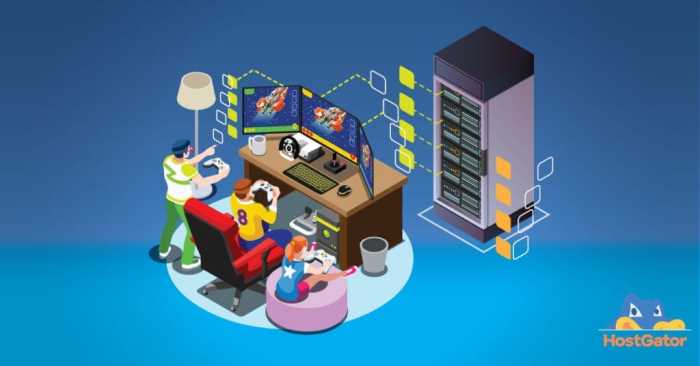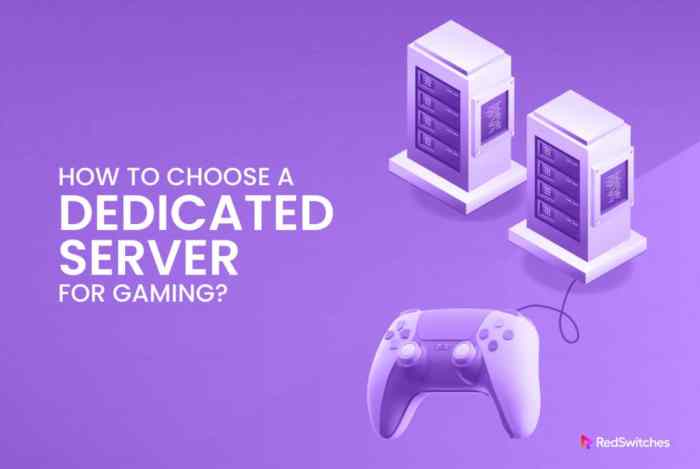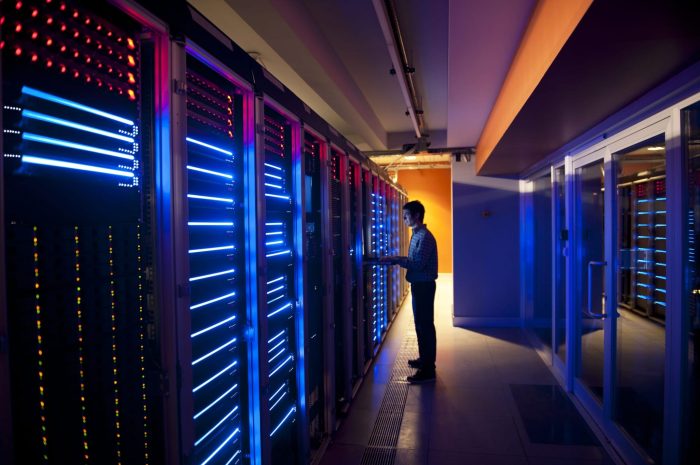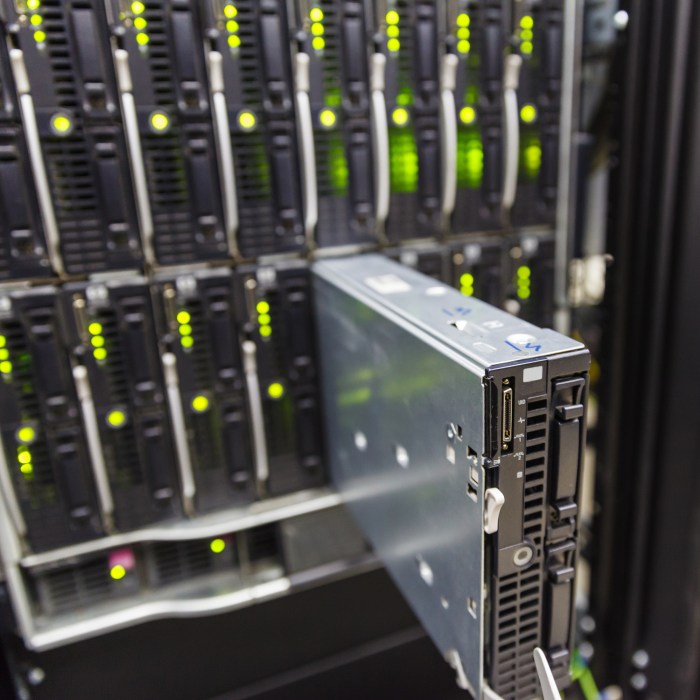Dedicated server for gaming: choosing the right hardware and software sets the stage for a smooth and immersive gaming experience. Whether you’re a seasoned gamer hosting a private server for friends or a developer launching a competitive multiplayer game, a well-configured dedicated server is crucial.
This guide dives into the essential considerations for building the ideal gaming server, covering hardware selection, software setup, network optimization, security measures, and cost management.
Choosing the right hardware and software is paramount to ensuring optimal performance, security, and control over your gaming environment. From understanding the core components like CPU, RAM, and storage to navigating the intricacies of operating systems and network configurations, this guide equips you with the knowledge to build a powerful and reliable gaming server that caters to your specific needs and budget.
Understanding Dedicated Servers for Gaming
Dedicated servers are like the VIP section of the internet, offering a premium experience for gamers. They’re powerful machines specifically designed to handle the demands of online gaming, providing a smoother, more secure, and more customizable environment.
Benefits of Dedicated Servers for Gaming
Dedicated servers provide a significant advantage for gamers, especially those who prioritize performance, security, and control.
- Improved Performance:Dedicated servers offer exclusive access to resources, eliminating the performance bottlenecks that can occur on shared hosting platforms. This means faster loading times, smoother gameplay, and reduced lag, resulting in a more enjoyable gaming experience.
- Enhanced Security:With dedicated servers, your game data and server environment are isolated from other users, minimizing the risk of security breaches and malicious attacks. This is crucial for protecting sensitive information and ensuring a secure gaming environment.
- Complete Control:Dedicated servers give you complete control over your server’s configuration, allowing you to customize settings, install specific software, and manage resources according to your needs. This level of customization is ideal for optimizing performance, implementing specific game rules, and ensuring a tailored gaming experience.
Differences Between Dedicated Servers and Shared Hosting for Gaming
While both dedicated servers and shared hosting can support online gaming, dedicated servers offer several advantages that make them a superior choice for serious gamers and game developers.
- Resource Allocation:Dedicated servers provide exclusive access to all server resources, including CPU, RAM, and bandwidth, ensuring consistent performance and avoiding performance bottlenecks caused by other users on a shared server.
- Security:Dedicated servers offer a more secure environment due to the isolation of resources and the ability to implement advanced security measures. Shared hosting platforms, on the other hand, can be more vulnerable to security threats due to the shared nature of resources.
- Customization:Dedicated servers allow for complete customization of server settings and software installations, enabling you to tailor the gaming experience to your specific requirements. Shared hosting platforms typically offer limited customization options.
Games That Benefit Most from Dedicated Servers
Dedicated servers are particularly beneficial for games that require high performance, low latency, and a secure environment. These include:
- Multiplayer Online Battle Arenas (MOBAs):Games like League of Legends and Dota 2 rely on fast server responses and low latency to ensure a fair and competitive gaming experience. Dedicated servers provide the necessary performance and security to support these demanding games.
- First-Person Shooters (FPS):Games like Counter-Strike: Global Offensive and Valorant require precise timing and fast reflexes. Dedicated servers minimize lag and ensure smooth gameplay, enhancing the competitive edge.
- Massively Multiplayer Online Role-Playing Games (MMORPGs):Games like World of Warcraft and Final Fantasy XIV involve large player populations and complex game worlds. Dedicated servers provide the necessary resources and stability to support these demanding games.
Choosing the Right Hardware: Dedicated Server For Gaming: Choosing The Right Hardware And Software

Building a dedicated gaming server requires careful consideration of hardware components to ensure optimal performance and a smooth gaming experience. The key components that need to be selected with care include the CPU, RAM, storage, and network interface. Each component plays a vital role in determining the server’s capabilities and overall efficiency.
CPU
The CPU, or central processing unit, is the brain of the server, responsible for processing all the instructions and calculations required for the game to run. For gaming servers, a powerful CPU is essential to handle the complex computations and interactions between players.
When selecting a CPU, consider the following factors:
- Core Count and Threads:A higher core count and thread count allow the CPU to handle multiple tasks simultaneously, improving performance in games with many players or complex gameplay mechanics. For example, a CPU with 8 cores and 16 threads can handle more simultaneous player actions than a CPU with 4 cores and 8 threads.
- Clock Speed:Clock speed determines the speed at which the CPU processes instructions. A higher clock speed generally translates to faster processing and better performance. However, it’s important to note that clock speed is only one factor, and other aspects like core count and cache size also play a significant role.
- Cache Size:Cache is a small, fast memory that stores frequently accessed data, allowing the CPU to access it quickly. A larger cache size can improve performance, especially in games with heavy data access patterns.
- CPU Architecture:Intel and AMD are the leading CPU manufacturers, each with their own unique architectures. Intel CPUs are known for their high clock speeds and excellent single-threaded performance, while AMD CPUs often offer more cores and threads at a lower price point.
The choice between Intel and AMD depends on the specific game requirements and budget.
RAM
RAM, or random access memory, is the server’s short-term memory, used to store data that the CPU needs to access quickly. For gaming servers, sufficient RAM is crucial for smooth gameplay and to prevent lag or stuttering. Consider these factors when choosing RAM:
- Capacity:The amount of RAM determines how much data the server can store and access simultaneously. The required RAM capacity depends on the game and the number of players. Games with large maps, complex environments, or many players require more RAM.
- Speed:RAM speed, measured in MHz, determines how fast the server can access data. Faster RAM can lead to improved performance, especially in games with high data access demands. However, the impact of RAM speed on performance is generally less significant than the CPU’s clock speed.
Storage
Storage is where the server’s data, including the game files, player data, and other files, is stored. The type of storage used can significantly impact performance, especially for games that require fast loading times or frequent data access. Here’s a table comparing different storage options:
| Storage Type | Performance | Cost | Usage |
|---|---|---|---|
| SSD (Solid State Drive) | High | Medium | Operating system, game files, frequently accessed data |
| NVMe (Non-Volatile Memory Express) | Very high | High | Operating system, game files, high-performance applications |
| HDD (Hard Disk Drive) | Low | Low | Storage for large files, backups, less frequently accessed data |
Network Interface
The network interface is the connection point between the server and the network, allowing players to connect and interact with the server. A high-quality network interface is essential for low latency and a smooth gaming experience. When choosing a network interface, consider these factors:
- Speed:Network interface speed, measured in Gbps, determines the maximum data transfer rate. A higher speed ensures faster data transfer between the server and players, reducing latency and improving responsiveness.
- Latency:Latency is the time delay between sending a request and receiving a response. Low latency is crucial for online gaming, as it ensures a smooth and responsive experience. A high-quality network interface with low latency can significantly enhance the gaming experience.
- Throughput:Throughput is the amount of data that can be transferred per unit of time. A high throughput network interface ensures that all players can connect and receive data without experiencing lag or performance issues.
Software Considerations

Choosing the right software for your dedicated gaming server is crucial for smooth gameplay, optimal performance, and efficient management. The software you select will influence the server’s stability, security, and overall user experience. This section explores the key software components that are essential for setting up and managing a dedicated gaming server, including operating systems, game server software, control panels, and monitoring tools.
Operating Systems
Operating systems provide the foundation for running software on your dedicated gaming server. The two most popular choices for gaming servers are Windows and Linux.
Windows
Windows is a well-established operating system known for its user-friendly interface and wide software compatibility. Its popularity extends to gaming, with many game developers creating their server software specifically for Windows.
- Advantages:
- Wide game server software support
- User-friendly interface
- Strong community and resources
- Disadvantages:
- Higher licensing costs
- Potentially higher resource consumption
- Security vulnerabilities
Linux
Linux is an open-source operating system known for its stability, security, and flexibility. Its command-line interface may appear daunting to beginners, but its versatility and customization options make it a popular choice for experienced server administrators.
- Advantages:
- Free and open-source
- Highly secure and stable
- Flexible and customizable
- Disadvantages:
- Steeper learning curve
- Limited game server software support compared to Windows
- May require more technical expertise for management
Game Server Software
Game server software is the heart of your gaming server, enabling players to connect and interact within the game world. Each game typically has its own dedicated server software, which is responsible for managing player connections, handling game logic, and ensuring smooth gameplay.
- Popular Game Server Software Options:
- Minecraft:Bukkit, Spigot, Paper
- Counter-Strike: Global Offensive (CS:GO):SourceMod, Metamod:Source
- Team Fortress 2:SourceMod, Metamod:Source
- Garry’s Mod:SourceMod, Metamod:Source
- Rust:Oxide, Facepunch
- Ark: Survival Evolved:Ark Server Manager
- Valheim:Valheim Dedicated Server
Control Panels, Dedicated server for gaming: choosing the right hardware and software
Control panels simplify the management of your gaming server, providing a user-friendly interface for tasks such as server configuration, updates, and monitoring. They streamline server administration, making it easier to manage multiple servers and perform routine maintenance.
- Popular Control Panel Options:
- Pterodactyl:Open-source, lightweight, and user-friendly
- Multicraft:Comprehensive control panel with advanced features
- GameCP:Specialized control panel for game servers
- Amisphere:Feature-rich control panel with a focus on security
Monitoring Tools
Monitoring tools are essential for keeping an eye on your server’s performance, identifying potential issues, and ensuring a smooth gaming experience. They provide valuable insights into server resources, network traffic, and player activity, allowing you to proactively address problems before they impact gameplay.
- Popular Monitoring Tool Options:
- Datadog:Comprehensive monitoring platform with a wide range of features
- New Relic:Powerful monitoring tool with excellent performance insights
- Prometheus:Open-source monitoring system known for its flexibility and scalability
- Grafana:Open-source visualization tool for monitoring data from various sources
Network Configuration

A stable and high-bandwidth network connection is crucial for a dedicated gaming server, as it directly impacts the overall gaming experience for all players. A strong network foundation ensures smooth gameplay, minimal lag, and a positive experience for everyone.
Network Configurations
The network configuration of your dedicated gaming server can significantly influence its performance. Choosing the right configuration ensures efficient communication between players and the server, minimizing latency and maximizing gameplay smoothness.
Dedicated IP Addresses
A dedicated IP address is essential for hosting a dedicated gaming server. This unique IP address allows your server to be easily accessible by players without relying on shared IP addresses, which can lead to unpredictable performance.
VPNs
While VPNs are often used for privacy and security, they can introduce additional latency and affect gaming performance. For a dedicated gaming server, using a VPN is not recommended, as it can introduce unnecessary network hops and slow down communication.
Server Latency
Server latency refers to the time it takes for a signal to travel from a player’s computer to the server and back. This delay, measured in milliseconds (ms), can significantly impact gameplay. High latency can lead to lag, rubberbanding, and a frustrating gaming experience.
Latency is a critical factor in online gaming, directly impacting gameplay responsiveness and smoothness.
Optimizing Network Performance
Optimizing your dedicated gaming server’s network performance is crucial for a smooth and enjoyable gaming experience. Here are some tips:
- Choose a reliable hosting provider:Opt for a hosting provider with a proven track record of high-quality network infrastructure and dedicated bandwidth.
- Consider server location:Place your server in a location geographically close to your target player base to minimize latency.
- Use a dedicated IP address:Avoid shared IP addresses, which can lead to unpredictable performance.
- Optimize network settings:Configure your server’s network settings for optimal performance, such as adjusting MTU (Maximum Transmission Unit) and TCP settings.
- Minimize network interference:Ensure your server is located in a network environment with minimal interference from other devices or applications.
Cost and Budget Considerations
Setting up and maintaining a dedicated gaming server comes with its own set of costs. You need to consider the initial investment in hardware, software, and hosting, as well as ongoing expenses like electricity, maintenance, and potential upgrades. Let’s break down the cost factors involved in detail.
Hardware Costs
Hardware costs are a significant initial investment. These costs include the server itself, storage, network components, and any additional peripherals.
- Server:The server is the heart of your dedicated gaming server setup. The cost of a server varies depending on its specifications, including processor, RAM, storage, and network capabilities. A powerful server with ample resources will handle more players and demanding games, but it will also come at a higher cost.
You can expect to pay anywhere from a few hundred dollars for a basic server to several thousand dollars for a high-end server.
- Storage:You’ll need storage to hold your game files, operating system, and any other data. Storage options include hard disk drives (HDDs), solid-state drives (SSDs), and network-attached storage (NAS) devices. SSDs offer faster performance but are generally more expensive than HDDs.
The amount of storage you need depends on the size of your game files and the number of players you expect to host.
- Network Components:Network components are essential for connecting your server to the internet and ensuring reliable gameplay. These include network interface cards (NICs), switches, routers, and possibly a dedicated internet connection. The cost of network components depends on the speed and capacity required.
- Peripherals:Depending on your needs, you might also need additional peripherals like a keyboard, mouse, monitor, or a dedicated UPS (Uninterruptible Power Supply) to protect your server from power outages.
Software Costs
Software costs include the operating system, game server software, and any other necessary software tools.
- Operating System:You’ll need an operating system to run your server. Popular options include Windows Server, Linux distributions like Ubuntu Server or CentOS, and macOS Server. The cost of an operating system can vary depending on the chosen platform and licensing options.
- Game Server Software:Each game requires specific server software to host it. Some games provide free server software, while others require a purchase or subscription. The cost of game server software varies depending on the game and its features.
- Other Software Tools:You might need additional software tools for managing your server, monitoring its performance, and securing your network. These tools can include server management software, monitoring software, and security software. The cost of these tools can vary depending on their features and complexity.
Hosting Costs
If you choose to host your server in a data center, you’ll need to pay for hosting services. Hosting costs can vary depending on the provider, location, server specifications, and additional services.
- Server Hosting Providers:There are numerous server hosting providers offering various service levels and pricing models. Some popular options include AWS (Amazon Web Services), Google Cloud Platform, Microsoft Azure, and DigitalOcean. Each provider has its own pricing structure, which can vary depending on the server specifications, location, and additional services.
It’s important to compare the pricing and features of different providers to find the best fit for your needs and budget.
- Service Offerings:Server hosting providers offer various service offerings, including dedicated servers, virtual private servers (VPS), and cloud servers. Dedicated servers offer the most resources and control, but they also come at the highest cost. VPS and cloud servers provide more flexibility and scalability but might offer fewer resources than dedicated servers.
The type of hosting service you choose depends on your specific needs and budget.
- Additional Services:Some hosting providers offer additional services like network management, security monitoring, and backups. These services can add to the overall cost of hosting your server. It’s important to consider the value of these services and whether they are necessary for your needs.
Ongoing Expenses
Beyond the initial investment, you’ll also have ongoing expenses associated with running your dedicated gaming server.
- Electricity:Your server will consume electricity, and the cost of electricity varies depending on your location and the server’s power consumption. It’s important to consider the electricity costs when budgeting for your server.
- Maintenance:Servers require regular maintenance, including software updates, security patches, and hardware checks. You might need to hire a professional to perform these tasks or invest in server management software to automate them. Maintenance costs can vary depending on the complexity of your server setup and the frequency of required maintenance.
- Upgrades:As technology advances, you might need to upgrade your server’s hardware or software to maintain performance and compatibility. Upgrade costs can vary depending on the components you need to replace or upgrade.
Sample Budget Breakdown
Here’s a sample budget breakdown for a dedicated gaming server setup:
| Category | Cost |
|---|---|
| Server Hardware | $1,500
|
| Storage | $200
|
| Network Components | $100
|
| Operating System | $100
|
| Game Server Software | $0
|
| Other Software Tools | $50
|
| Hosting (Monthly) | $50
|
| Electricity (Monthly) | $20
|
| Maintenance (Monthly) | $20
|
Note: This is just a sample budget breakdown, and actual costs can vary significantly depending on your specific needs and choices.
Closure

Building a dedicated gaming server involves a careful balance of hardware, software, and network expertise. By understanding the key factors Artikeld in this guide, you can create a robust and stable platform that delivers a seamless gaming experience for yourself and your players.
From selecting the right CPU and RAM to optimizing network connectivity and implementing security measures, each step contributes to a successful gaming server that meets your performance expectations and safeguards your data. Whether you’re hosting a small group of friends or launching a large-scale multiplayer game, the principles discussed here provide a solid foundation for building a dedicated gaming server that enhances your gaming experience and empowers you to control your online gaming environment.